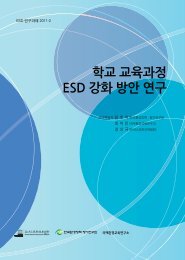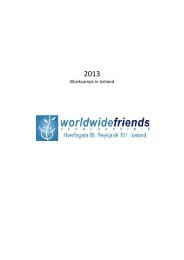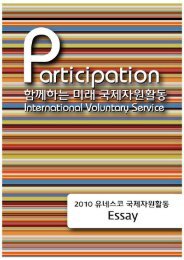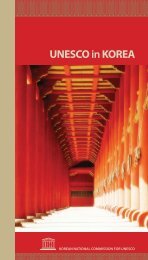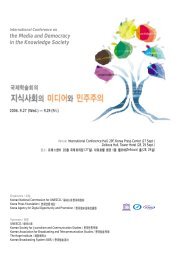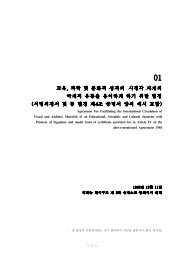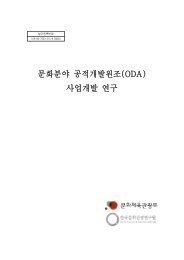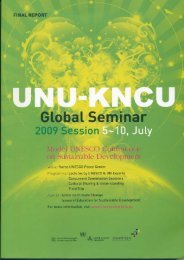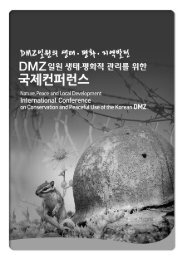íëìë³´ë2012문íì ë°ì ë¼ì´ëí ì´ë¸.pdf - ì ë¤ì¤ì½íêµììí
íëìë³´ë2012문íì ë°ì ë¼ì´ëí ì´ë¸.pdf - ì ë¤ì¤ì½íêµììí
íëìë³´ë2012문íì ë°ì ë¼ì´ëí ì´ë¸.pdf - ì ë¤ì¤ì½íêµììí
Create successful ePaper yourself
Turn your PDF publications into a flip-book with our unique Google optimized e-Paper software.
the main land of Australia where you can just have interviews and ask questions. How and<br />
when questions are asked and framed is very carefully calibrated for these cultural conditions.<br />
Finally, in relation to the issue of the possible conflict between economics and culture in<br />
the areas we’ve been talking about, I’ve talking very positively about the fact that these<br />
conflicts should not be seen as conflicts but that they can actually move together. The<br />
emphasis on the economic contribution of culture is really just a way I think in some respect<br />
of international agenda of getting culture on the table. It is often the way in which you can<br />
persuade ministers of finance and other hard-headed people that culture is important because<br />
of potentials for economic contributions. It is actually the cultural contents and artistic<br />
cultural contenst that is really what’s important about culture. The potential for economic<br />
contributions is instrumentally useful in achieving the sorts of things that the MDGs are<br />
going after. As a part of the agenda, the nuances or strategies may be necessary in order to<br />
advance the cause of culture on the table in the review of MDGs.<br />
Kwak, Jae Sung<br />
Professor at the Graduate School of Pan-Pacific International Studies<br />
I have reconsidered what Professor Koo’s remark on regional culture. I agree that in<br />
smaller countries with large market capacity, such as Korea, taking an economic approach<br />
without proper funding to promotion of regional cultural events without applying the laws of<br />
the market may risk a distortion of the cause.<br />
However, this same logic may not apply to the developing nations. When taking an<br />
economic approach without proper funding, the market is unlikely to survive. This is because<br />
in order for the market to be intact, a vertical integration is needed beginning from the basic<br />
infrastructure. Without such conditions, even if a country possesses a significant cultural<br />
heritage, it will not bring forth economic benefit. Thus, to a certain degree, funds should be<br />
provided from the ODA. After a while, market logic can be applied.<br />
I hope Korea takes on the role of a catalyst to provide an advanced framework for ODA.<br />
Our ODA is actually not feasible. We do not owe anything to others since we were never a<br />
colonialist nation nor a regional hegemony. Our ODA is out of good faith. The reason why<br />
our ODA does not have a set direction is because we are not obligated to help anyone. Our<br />
ODA is based on a shared understanding or one another. To achieve this goal, we must stop<br />
sending technicians without a field specialist Such change should be initiated among the<br />
program developers.



